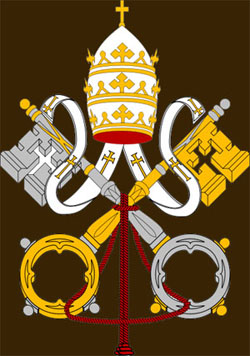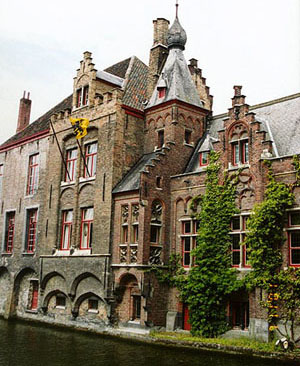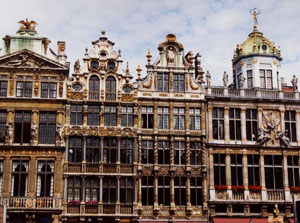 |
Organic Society
The Perfect Societies: Church & State
Plinio Corrêa de Oliveira
Of the two perfect societies – the Church and the State - the Church is the more elevated. What does “perfect” mean in this case?
I have seen progressivists laugh at the Church, saying: “Traditionalist Catholics say that the Church is a perfect society, but look at this or that Pope who was imperfect. How can the Church call herself a perfect society?” This kind of objection only proves that the person making it has no idea what he is talking about.

The gold papal key represents his direct power over the spiritual sphere, the silver key his indirect power over the temporal sphere |
Perfect here does not mean that it is morally perfect, but socially perfect. Perfect comes from the Latin per factum, which means that it is a society that in fact has all the necessary means to attain its proper goal. The goal of the State is to provide order, harmony, assistance, instruction and protection for its members. Since a State normally has the means to do these things, it is called a perfect society.
The Church is a perfect society because Our Lord Jesus Christ founded her to bring people to know, love and serve God above all things and, doing so, to save their souls. The Church also strives to fulfill God’s will on earth so that the life here will become as similar as possible to that of Heaven.
To achieve these goals, Our Lord established the Papacy and the Hierarchy to govern and teach the Church, instituted the Sacraments to distribute grace, and gave her all the necessary means to be healthy, ordered, harmonic and independent, as well as to protect herself against the spiritual enemies who attack her either from outside or within. Hence, the Church is also a perfect society.
Since both the temporal and the spiritual spheres are perfect societies, and both of them exercise their influence and power over the same people, their individual spheres must be defined to avoid conflicts.
Doctrine and History teach us that the State should intervene neither in the Church’s affairs (the elections of Popes, nominations of Bishops and priests) nor in the Church’s moral and dogmatic teaching, as well as the issuing of her laws. Analogously, the Church should not intervene in the affairs of State, unless it is to prevent sin (ratio peccati - for reason of sin). She can have an influence over the State through the supernatural virtues that emanate from her, as the only true Church of the only true God. But this does not mean that she should intervene directly in the temporal sphere.
Therefore, both the spiritual and temporal spheres are independent, and they should have a harmonic relationship. They need each other not to attain their essential goals, but for secondary purposes. The State should provide the Church protection against her temporal enemies and give the Church material help should she need it. The Church should offer the State protection against its spiritual enemies, ameliorate the relationship of the State with its subjects, and inspire its customs and laws to follow Catholic doctrine.
Both spheres are perfect and sovereign, but should live in harmony.
Of the two perfect societies, the Church is the more elevated because her goal is eternal while the goal of the State is transient. This does not mean, however, that the State is dispensable. Both the Church and the State are indispensable. Each has its proper role that cannot be replaced - except temporarily - by the other.
As a consequence, the priest should not enter into the affairs of the layman, just as the layman should not enter into those of the priest.
Counter-revolutionary Catholics like us have a special vocation to know, love and defend a harmonic relationship between the Church and the State.
Obedience and participation in power
These two societies are formed of a large number of intermediary bodies.

Guild buildings in Bruges, above, and in La Grand Place of Brussels, below, illustrate their influence
 |
Insofar as the State maintains these intermediary bodies and promotes their growth, it is organic and feudal; to the degree that it stifles or extinguishes them, it becomes artificial and revolutionary.
For example, in a feudal State an inter-relationship exists between it and the members of those intermediary bodies so that none of the latter would simply obey without having a voice or exercising some influence in the State power. I believe this is an important point to stress.
In the Middle Ages, the workers in a guild would have a participation in the government of their guild in some form or another. The guilds had their own hierarchy – the master craftsman, journeyman and apprentice – that was respected. They also had a strong religious component: they normally chose a patron saint, someone who had a close relation to their profession. Often the president of a guild’s religious fraternity was a journeyman or even an apprentice, and this did not upset the normal hierarchy existing in the guild. The master would not be offended or regard it as it an affront to his authority. It was considered as absolutely normal.
This should give a notion of how the intermediary bodies of an organic society worked. Even though there was an official hierarchy in the guild, in practice, the authority would have many exceptions to the rules that grounded the institution in the lives of the people. Theory alone cannot give you a picture of the whole reality. While theory is necessary to understand the structure of the guilds, you need to place the rules between parentheses and see the large number of exceptions that weave the rich fabric of reality. The one who understands this apprehends the whole of reality - with its rules and exceptions. It is difficult to have this vision, but it is also much more interesting.
In this totality of the picture, we see that the guilds would often play a role in the administrative affairs in their town or city. It was not rare that a city with strong guilds and many workers, the guilds would become the dominant power of the city.
We must understand that as a rule the social classes are distinct. At the same time, we should realize there are many exceptions that should be accepted amiably and with good will, and not with suspicion or fear. The fact that an organization of an inferior nature at times would exercise a power of a superior nature should be freely acknowledged. This would not diminish the superior organizations in any way.
Abbesses as temporal governors
No one strives more than the Church to instruct women in their proper place in society, that is, to be subject to man: This is the rule.
However, only under the inspiration of the Church did states exist where the governors were women. This occurred in the large Convents that had temporal estates so large that they became temporal fiefs. For this reason, the Abbesses in effect would receive temporal titles such as countess, duchess or princess of that land and province. In fact they would exercise the temporal power over those populations and be respected as such.
This exception to the rule was made without a planning committee - it occurred organically.
In part of its history the Holy German Roman Empire was composed of around 1,000 small States. Several of those States were governed by women. It is perfectly comprehensible. It is organic.

Posted June 14, 2010

  | | Prof. Plinio |
Organic Society was a theme dear to the late Prof. Plinio Corrêa de Oliveira. He addressed this topic on countless occasions during his life - at times in lectures for the formation of his disciples, at times in meetings with friends who gathered to study the social aspects and history of Christendom, at times just in passing.
Atila S. Guimarães selected excerpts of these lectures and conversations from the trancripts of tapes and his own personal notes. He translated and adapted them into articles for the TIA website. In these texts fidelity to the original ideas and words is kept as much as possible.

Related Topics of Interest
 A Participative Society A Participative Society
 How Intermediary Societies Participate in the State Power How Intermediary Societies Participate in the State Power
 The Organic Formation of a Region The Organic Formation of a Region
 All Classes Should Have Elites All Classes Should Have Elites
 The Immaculate Character of the Catholic Church The Immaculate Character of the Catholic Church
 Thy Will be Done on Earth as It Is in Heaven Thy Will be Done on Earth as It Is in Heaven
 Is the Catholic Church still a Monarchy? Is the Catholic Church still a Monarchy?

Related Works of Interest
|
|
Organic Society | Social-Political | Home | Books | CDs | Search | Contact Us | Donate

© 2002-
Tradition in Action, Inc. All Rights Reserved
|
 |
|